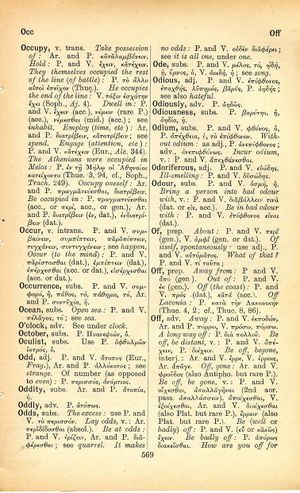off
Ἄξιόν ἐστι τὸ ἀρνίον τὸ ἐσφαγμένον λαβεῖν τὴν δύναμιν καὶ τὸν πλοῦτον καὶ σοφίαν καὶ ἰσχὺν καὶ τιμὴν καὶ δόξαν καὶ εὐλογίαν → Worthy is the Lamb that was slain to receive power, and riches, and wisdom, and strength, and honour, and glory, and blessing
English > Greek (Woodhouse)
prep.
Away from: P. and V. ἀπό (gen). Out of: P. and V. ἐκ (gen.). Off (the coast): P. and V. πρός .(dat.), κατά (acc.). Off Laconia: P. κατὰ τὴν Λακωνικήν (Thuc. 4, 2; cf., Thuc. 8, 86). adv. Away: P. and V. ἐκποδών, Ar. and P. πόρρω, V. πρόσω, πόρσω. A long way off: P. διὰ πολλοῦ. Be off, be distant, v.: P. and V. ἀπέχειν, P. διέχειν. Be off, begone, interj.: Ar. and V. ἔρρε, V. ἔρροις, Ar. ἄπαγε. Off, gone: Ar. and V. φροῦδος (also Antipho. but rare P.). Be off, be gone, v.: P. and V. οἴχεσθαι, ἀπαλλαγῆναι (2nd aor. pass. ἀπαλλάσσειν), ἀποίχεσθαι, V. ἐξοίχεσθαι, Ar. and V. διοίχεσθαι (also Plat. but rare P.), ἔρρειν (also Plat. But rare P.). Be (well or badly) off: P. and V. (εὖ or κακῶς) ἔχειν. Be badly off: P. ἀπόρως διακεῖσθαι. How are you off for friends: V. πῶς δʼ εὐμενείας (gen. sing.) . . . ἔχεις; (Eur., Hel. 313). Come off, v.: see occur. Of a person, come off (better or worse): P. and V. ἀπαλλάσσειν. Cut off: lit., P. and V. τέμνειν, κόπτειν, Ar. and P. ἀποτέμνειν, V. θερίζειν, ἀπαμᾶν; see under cut. Intercept: P. ἀπολαμβάνειν, διαλαμβάνειν. Destroy: P. and καθαιρεῖν; see destroy. Get off: see escape. Be acquitted: P. and V. φεύγειν, σώζεσθαι, Ar. and P. ἀποφεύγειν. Keep off, ward off: P. and V. ἀμύνειν; see ward off. Refrain: P. and V. ἀπέχειν. Lie off, of a ship: P. ἐφορμεῖν (dat.); of an island: P. ἐπικεῖσθαι (dat. or absol.). Make off, run away: Ar. and P. ἀποδιδράσκειν. Put off, defer: P. and V. ἀποτίθεσθαι, εἰς αὖθις ἀναβάλλεσθαι; see under put. Take off (clothes, etc.): P. and V. ἐκδύειν, Ar. and P. ἀποδύειν. Take off from oneself: use mid. of verbs given. Parody: Ar. and P. κωμῳδεῖν (acc.).

